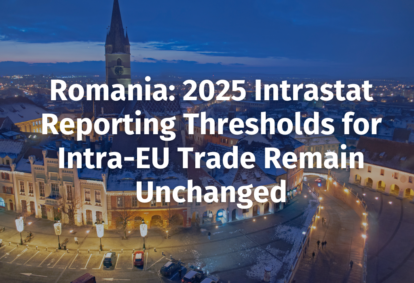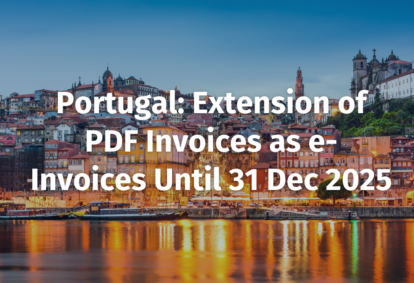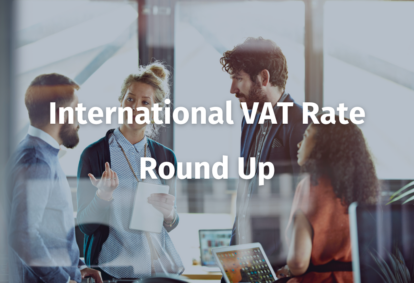Global VAT Guide: December 2021 VAT Updates
December 2021 VAT Updates in Finland
From 1 January 2022, the Intrastat thresholds in Finland will change to the below:
- Intrastat arrivals:
- 2021 – EUR 600,000
- 2022 – EUR 700,000
- Intrastat dispatches:
- 2021 – EUR 600,000
- 2022 – EUR 700,000
December 2021 VAT Updates in France
Intrastat Changes
From 1 January 2022, the DEB return in France will be changed.
Up until now, both the Intrastat and EC Sales List were integrated within the DEB return.
From 1 January 2022, a new regulation will introduce:
- The fiscal return, EC Sales List; and
- A statistical return relating to intra-community exchange of goods, Intrastat.
The threshold for submitting the new French Intrastat returns id EUR 460,000 per year for both arrivals and dispatches.
Reverse Changes on Imports
From 1 January 2022, the import VAT reverse charge mechanism will become compulsory in France.
This applies to imports made from B2B taxable operators in France in relation to the delivery of goods from a third country into the EU via France and in relation to imports to/from French overseas departments.
Taxable persons that are established in French overseas departments are deemed to have a French intra-community VAT number issued to them by the DGFiP, Directorate of Public Finances.
Import VAT will be paid to the tax authorities and not to the customs agency.
It will be mandatory to file a VAT return (a form CA3) and to have a valid intra-community VAT number from 1 January 2022.
The VAT registration in France can be completed by taxable persons established in France or by taxable persons in the EU/UK.
Any companies that are not established in the EU will need to appoint a French tax representative and this representative will file the VAT registration on their behalf.
This change will simplify processes with a partial pre-filled VAT declarations and the creation of a specific reverse-charge space on the customs authority’s website where data from import declarations will be available.
From 1 January 2022, a taxable person that does not have a valid French VAT number will not be able to use the self-charge system for import VAT and the tax will need to be paid to the customs authority.
December 2021 VAT Updates in Hungary
The Hungarian Finance Minister has announced that the VAT gap, expected VAT revenue and VAT actually collected, has fallen to 6.1%.
In 2020, the VAT gap was just above 22%.
December 2021 VAT Updates in Luxembourg
Luxembourg has initiated the gradual roll out of mandatory electronic invoicing to all government institutions through the PEPPOL network.
This roll out is part of the European Union’s Digitization plan according to Directive 2014/55/EU.
The roll out of mandatory electronic invoicing aims to reduce fraud and to improve transparency.
In an attempt to alleviate the challenges that e-invoicing may cause smaller businesses; the government has set the deadlines of mandatory e-invoicing depending on the size of businesses:
- Large businesses
- E-invoicing has been mandatory since 1 September 2021
- A large business is a business that meets at least two of the below requirements
- An annual turnover more than EUR 40 million;
- Have a balance over EUR 20 million; and
- Between 250 full time employees.
- Medium size businesses
- E-invoicing will be mandatory from 1 February 2022
- A medium size business is a business that meets at least two of the below requirements:
- An annual turnover between EUR 8.8 million and EUR 40 million;
- Have a balance between EUR 4.4 million and EUR 20 million; and
- Between 50 and 250 full time employees.
- Small size businesses
- E-invoicing will be mandatory from 1 July 2022
- A small size business is a business that does not meet the conditions of large and medium size businesses and meet the below requirements:
- A maximum annual turnover of EUR 8.8 million;
- Have a maximum balance of EUR 4.4 million; and
- A maximum of 50 full time employees.
December 2021 VAT Updates in Romania
The Romanian government wants streaming service operators to pay a 4% tax on their revenues that are obtained in Romania from transactions or subscriptions.
This money would go to the Film Fund and these funds would help finance the domestic movie industry.
This fee would apply to streaming services like HBO, Amazon Prime and Netflix.
They also want the streaming service operators to pay a fee of 3% of the price of movies that are downloaded for a fee.
Companies that would be exempt from the 3% and 4% taxes are companies whose revenues in the last fiscal year did not exceed the amount of EUR 65,000 and their audience level is below 1%, relative to the number of national subscribers.
December 2021 VAT Updates in Slovakia
The Slovakian government has made an amendment to the Slovakian VAT Act as they introduce some measures to improve VAT collection.
From 15 November 2021 to 30 November 2021, taxable persons were required to report their bank accounts to the Financial Directorate. The Tax Authorities must also be notified of any changes or deletion of a reported bank account.
This reporting obligation is applicable for bank accounts, which are used:
- To receive payments for the supply of goods and services subject to VAT; and
- For sending payments for the supply of goods and services, subject to VAT.
Account numbers should be reported electronically on a form that is published on the Tax Authorities website.
If the form is filled out incorrectly or contains false/incomplete information, there can be fines of up to EUR 10,000 imposed.
From 1 January 2022, the Tax Authorities will process VAT refunds to the bank account that has been registered.
If the bank account has not been registered, the Tax Authorities will refund the VAT within ten days from the day the taxable person has notified the Tax Authorities of the bank account.
December 2021 VAT Updates in Australia
The Treasury in Australia has announced its proposal to introduce reporting obligations on platforms in the gig and sharing economy.
If the proposal were introduced, this would mean the operators of electronic marketplaces would be required to report their transactions to the ATO, Australian Taxation Office.
The new reporting obligation would begin from 1 July 2022 for the below transactions:
- Supplies of short-term accommodation; and
- Supplies of taxi travel.
The new reporting requirement would apply to gig economy platforms such as Airbnb and Uber.
December 2021 VAT Updates in Panama
Panama has published an amendment to Law 76 in relation to invoicing.
From 2022, registered taxpayers will issue e-invoices through the electronic system of Panama (SFEP, sistema de facturación electrónica de Panamá).
E-invoices can be issued using a qualified authorized provider or directly through the free invoicing system of the tax authority.
The government hopes that every business will adopt e-invoicing as soon as possible. Some businesses have already joined the pilot e-invoicing program.
Below is a rollout timeline for e-invoicing:
- 1 January 2022, all taxpayers that are newly registered must issue e-invoices through the e-invoicing system SFEP;
- 30 July 2022, all business will be obligated to send e-invoices for their B2G invoices through SFEP; and
- 2 January 2023, taxpayers that participated in the pilot e-invoicing program must begin issuing e-invoices for all domestic transactions.
December 2021 VAT Updates in Saudi Arabia
The ZATCA, Zakat Tax and Customs Authority, have announced violations in relation to e-invoicing will result in penalties and fines.
The fines will depend on the type of violation and the number of times the violation has occurred.
Below is a list of the penalties and fines:
- Failure to include QR codes on simplified invoices and the failure to inform the ZATCA of any issues that result in an inability to produce e-invoices:
- The penalty will be up to SAR 50,000 when the ZATCA has warned the taxpayer.
- Non issuance of e-invoices and failure to archive e-invoices:
- The fines will be between SAR 1,000 and SAR 50,000.
- The deletion of amendment of e-invoices after their issuance:
- The fines will be between SAR 10,000 and SAR 50,000.
The first phase of e-invoicing begins on 4 December 2021 and taxpayers are urged to prepare their e-invoicing systems in accordance with the requirements.
Taxpayers will have to create structured e-invoices. Invoices must contain all relevant fields specified by ZATCA and must contain a QR code.
In the first phase, the e-invoices do not need signature or verification to be sent.
The second phase of e-invoicing will come into effect at the beginning of January 2023.
This phase will see the introduction of e-invoice transmission and exchange using the online GAZT platform and there will be a mandatory format that will be used when issuing invoices.
December 2021 VAT Updates in United Kingdom
From 1 April 2022, Making Tax Digital for VAT will be extended to smaller VAT registered businesses.
MTD will be extended regardless of business size or if businesses are registered for VAT voluntarily.
For the first VAT period beginning on/after 1 April 2022, VAT registered businesses that are currently not required to operate MTD will have to:
- Keep their records digitally; and
- Provide their VAT return information to HMRC through Making Tax Digital compatible software.
The current threshold is £85,000 and it is estimated this extension to all VAT registered businesses will affect approximately 1.1 million VAT registered businesses.
About a quarter of VAT registered businesses that are below the threshold of £85,000 have voluntarily chosen to register for MTD and submit their VAT returns using the compatible software.
The HMRC will being notifying the remaining businesses and will send letters to an initial wave of over 300,000 voluntarily VAT registered businesses to remind them of their obligations from 1 April 2022.
Work with real VAT experts
With over 15 years’ experience in the area of VAT compliance and consultancy, we handle all countries and languages where VAT obligations exist. We have a dedicated & centralized team of VAT experts, with a reputation of excellence within all global tax offices ready to speak to you about your VAT obligations.
Taxback International
For over 25 years Taxback International has been a world leader in VAT consultancy and compliance providing expert support to more than 12,000 global clients including Apple, Google, IBM, and Twitter.
With increasing digitalization of global tax processes, we have developed tailored technology solutions to solve challenges facing companies today.
- Comply – End-to-end VAT compliance platform.
- TBI Pay – Streamlined cross-border payments technology.
- VAT Connect – Cloud-based, automated review of transactional data and images via AI and Machine Learning for Domestic and Foreign VAT Reclaim.



